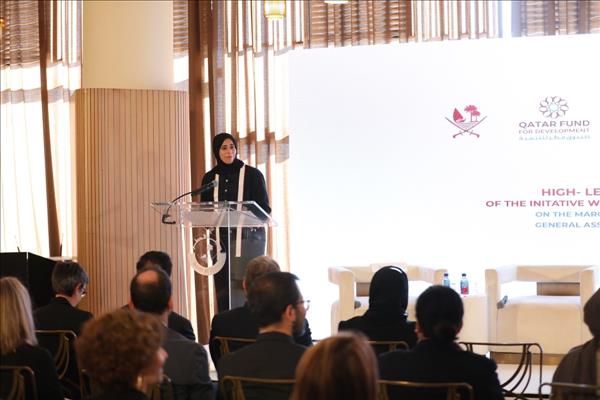
Qatar Fund For Development Initiative To Support Women In Conflict Zones
New York: Qatar Fund for Development (QFFD) launched yesterday“Women in Conflict Zones” initiative, in an official ceremony on the sidelines of the 77th session of UN General Assembly in New York, to support women and girls in conflict and crisis contexts.
Addressing the ceremony, Minister of Social Development and Family H E Maryam bint Ali bin Nasser Al Misnad called for Qatar and the United Nations to work together to address the roots of conflicts so that more women and children would not suffer from the effects of wars. In this regard, the minister referred to the recent call of Amir H H Sheikh Tamim bin Hamad Al Thani to end conflicts before they get out of control.
Assistant Foreign Minister H E Lolwah bint Rashid Al Khater said the announcement of this initiative comes to confirm the commitment of Qatar and its strategic partners to achieve the main objective of the initiative, which is to provide protection for women in conflict areas.
She stressed that Qatar will continue to fund, support and implement a number of projects through humanitarian and development assistance to provide women and children with tools that will help them lead a dignified life in conditions of conflict.
QFFD Director-General, Khalifa bin Jassim Al Kuwari, said the initiative will give priority to mobilising efforts and support for the protection of women in conflict zones, as well as facilitating and encouraging women's participation in the economic and social sector to be part of the workforce to achieve a decent life for them.
Al Kuwari added that the initiative calls for avoiding conflicts, preserving peace, and avoiding violence against women in conflict zones by supporting the international community's call to work on protection from gender-based violence in emergency situations.
He believed that the initiative would also help focus humanitarian and development assistance to promote gender equality through access to funding programmes for women, education and capacity development programmes, including vocational training for girls and women, which would help bring about important changes in the lives of women in conflict zones.
UNDP Administrator Achim Steiner described the Women in Conflict Initiative as a“global initiative”.
He said the initiative will focus on responding to the needs of women and their families during crises, empowering women to bring about positive change, and engaging women in the peacemaking process across six core areas: crisis response, education, health care, economic opportunities, technology, and peacebuilding.
Some of the beneficiaries also participated in the event via video conference. Amani Al Maqadma, a beneficiary of Qatar Grants Program funded by QFFD, and Somaya Farooqi, a student from the Afghan Robotics Team, spoke about their experiences as women in conflict zones. QFFD, in cooperation with its strategic partners, aims, through this initiative, to provide the necessary resources for women in conflict zones to become future leaders, peacemakers and builders for future generations.
The initiative reflects Qatar's commitment to support women in crises, in addition to enabling them to bring about effective positive change in conflict-stricken societies by involving them in international peacekeeping and security operations at all levels.
The Women in Conflict Zones Initiative aims to strengthen efforts to provide greater protection for women in conflict zones, prevent conflict and war, and widely recognising that women and girls should not be seen as victims of conflict, crisis and instability, but rather as an essential component of these societies.
The initiative also aims to empower women and girls to assume leadership roles in their communities by enhancing their decision-making skills and allowing them to contribute effectively within their communities.
Women and young girls around the world continue to be exposed to high levels of violence, poverty, exclusion and marginalisation, especially in situations of conflict and war, where violence targets them, directly, to have short and long-term effects on them, and pushing them to greater vulnerability, poverty and insecurity.

Legal Disclaimer:
MENAFN provides the
information “as is” without warranty of any kind. We do not accept
any responsibility or liability for the accuracy, content, images,
videos, licenses, completeness, legality, or reliability of the information
contained in this article. If you have any complaints or copyright
issues related to this article, kindly contact the provider above.


















Comments
No comment